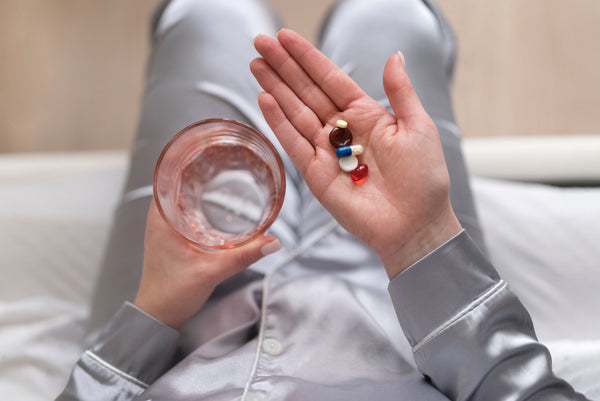Apple cider vinegar (ACV) is a popular ingredient these days. Everyone from rich celebrities to home-maker moms consume apple cider vinegar. And why not? Afterall ACV improves digestion, your body, and promotes overall wellbeing.
But can you consume as much ACV as you like? Well, if you’re looking for an answer to this question, read along. This blog will tell you about the benefits and the right apple cider vinegar dosage. Also, we’ll help you with some classy ACV supplements.
So, let’s get started.
What is apple cider vinegar?
You can think of ACV or apple cider vinegar as apple juice made from fermented apples. It’s made by crushing the apples and then exposing them to yeast. This exposure turns it into alcohol. The alcohol is fermented once again, making it apple cider vinegar.
What are the benefits of apple cider vinegar?
Some of the primary benefits of apple cider vinegar are as follows:
Cholesterol and Blood Pressure
ACV is naturally rich in antioxidants. And these antioxidants help reduce bad cholesterol and improve good cholesterol, as per research.
Renin is a hormone that helps in dilating and constricting blood vessels. When the blood vessels contract, the blood pressure rises, which is quite a problem. Fortunately, ACV controls renin, keeps the blood vessels dilated, and hence improves the blood pressure.
Better digestion
Apple cider vinegar promotes acidity in your body. And this produces an enzyme called pepsin which helps break down proteins. So, before taking a protein-rich diet, you can consume ACV for better protein digestion.
Lose weight
ACV may help reduce weight by making you feel full throughout the day. If you remain full, you’ll eat less, which means you’ll eventually lose weight.
Are there any side effects of overdosage of apple cider vinegar?
Yes, overdosage of apple cider vinegar can lead to some issues like:
- Delay in emptying your stomach: it’s because ACV reduces the movement of food in the digestive tract.
- Digestive issues: The loss in appetite due to ACV sometimes leads to nausea.
- Tooth enamel erosion: apple cider vinegar is acidic and can slowly erode your tooth enamel.
- Throat burns: A concentrated solution of ACV can cause throat burns in kids.
- Medications: Some medications interact with ACV. So, consult with your doctor before consuming.
What is the right dosage for Apple cider vinegar?
Somewhere between 10-20 ml organic apple cider vinegar diluted in water, either once or twice a day, is the ideal quantity to have regularly, unless you are allergic to vinegar.
Having said that, it is best to consult a doctor about the same. Ideally, the right dosage of ACV depends on what you’re taking it for and how your body reacts to it. It means there isn’t any one-size-fits-all formula for this.
So, in that case, the best decision will be to consult your dietician or doctor regarding the dosage. They’ll examine your body and will suggest the right dosage.
Where can you get Apple Cider Vinegar?
Although the market is full of ACV drinks, you need something reliable. And this is why we have listed some of the best products in the market: Apple Cider Vinegar & Apple Cider Vinegar with Amla and Turmeric by Wellbeing Nutrition.
Apple Cider Vinegar
This ACV is made from raw fermented Himalayan red and golden apples. It’s rich in antioxidants, vitamins, and minerals supporting your overall wellbeing.
Here are some benefits of this supplement:
- Regulates your PH levels.
- Prevents acid reflux, bloating, and gas.
- Helps with healthy blood sugar levels.
- Improves heart health.
- Improves skin health.
- Reduces inflammation and improves immunity.
- Detoxifies and cleanses the body.
- Fights cold and relieves allergies.
All these benefits are enclosed in this tasty Apple cider Vinegar drink from Wellbeing Nutrition.
Apple Cider Vinegar with Amla and Turmeric (ACV+)
This product from Wellbeing Nutrition is kind of an upgrade to the previous one. It’s because of the extra ingredients this vinegar comes with. This ACV comes with the goodness of black pepper, cinnamon, turmeric, and amla. Black pepper pairs well with turmeric as it ensures better absorption of the latter.
And all these ingredients are quite good for your health. Also, due to these ingredients, the bitterness of vinegar is significantly reduced.
Here are some benefits of ACV or apple cider vinegar plus:
- Regulates your PH levels.
- It prevents acid reflux, bloating, and gas.
- Helps with healthy blood sugar levels.
- Improves heart health.
- Improves skin health.
- Reduces inflammation and improves immunity.
- Detoxifies and cleanses the body.
- Fights cold and relieves allergies.
Now, you can consume either or both of these products to enjoy the benefits. And if you want to buy both of them, you can instead go for Health Booster Kit. This product is a combo that includes both of the aforementioned products. You can purchase the kit and give your body a sound overall wellbeing.
Although the above products are clinically proven to not have any side effects, it is still recommended to seek your doctor’s advice before making them a part of your daily routine. It’s because some people may be allergic to vinegar.
Wrapping Up
Everything, including apple cider vinegar, is beneficial in the right quantity. Overdose might lead to complications that are totally uncalled for. So, always talk to your doctor and ask for the right dosage for your body.
References
- Akanksha, Singh & Mishra, Sunita. (2017). STUDY ABOUT THE NUTRITIONAL AND MEDICINAL PROPERTIES OF APPLE CIDER VINEGAR ARTICLE INFO ABSTRACT. 8. (https://www.researchgate.net/publication/322953260_STUDY_ABOUT_THE_NUTRITIONAL_AND_MEDICINAL_PROPERTIES_OF_APPLE_CIDER_VINEGAR_ARTICLE_INFO_ABSTRACT).
- Shishehbor F, Mansoori A, Sarkaki AR, Jalali MT, Latifi SM. Apple cider vinegar attenuates lipid profile in normal and diabetic rats. Pak J Biol Sci. 2008 Dec 1;11(23):2634-8. doi: 10.3923/pjbs.2008.2634.2638. PMID: 19630216. (https://www.ncbi.nlm.nih.gov/pubmed/19630216).
- Suiryanrayna MV, Ramana JV. A review of the effects of dietary organic acids fed to swine. J Anim Sci Biotechnol. 2015;6:45. Published 2015 Oct 21. doi:10.1186/s40104-015-0042-z. (https://www.ncbi.nlm.nih.gov/pmc/articles/PMC4618844/).

























